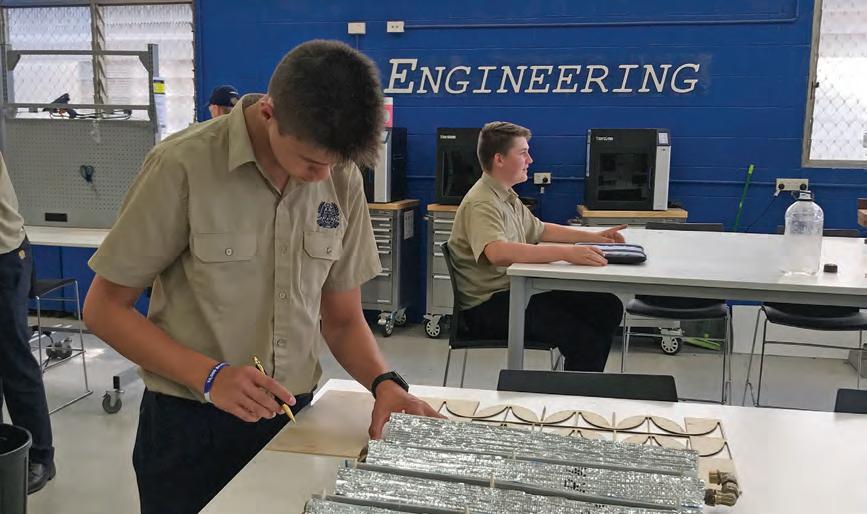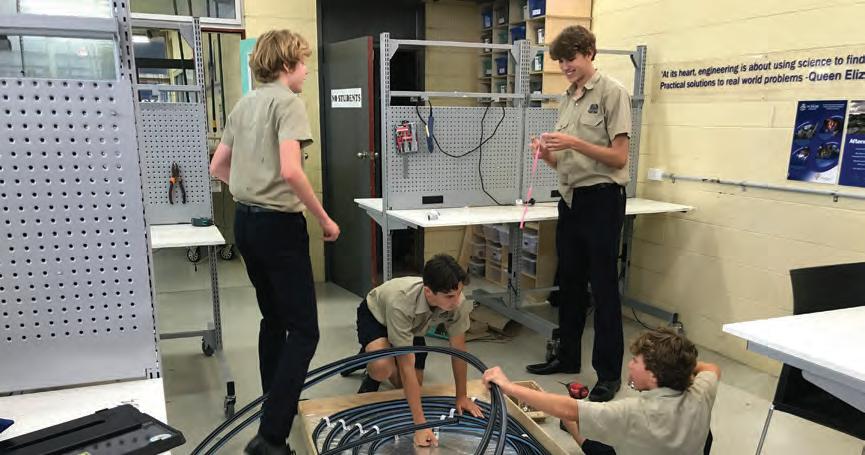
5 minute read
THE EVOLUTION OF THE TECHNOLOGIES FACULTY
Young people are digital citizens, raised with technology at their fingertips. Modern teaching strategies are harnessing its power to enhance student engagement and an individualised approach to learning.
The Nudgee College Technologies Faculty has spent the last three years focussing on changing our pedagogical practice towards challenge based learning and design thinking, using emerging technologies as the lens through which learning takes place. In an era of knowledge explosion, teachers must keep pace with the everchanging society by continuously learning and adapting. While teachers tackle the evolution of educational paradigms such as online learning, they must keep pace with new curriculum implementation and challenges associated with technology advancements.
Innovation and change is paramount to improving student outcomes through more engaging digital technologies and classroom activities. Holding onto traditional education models of rote learning and explicit instruction fails to “foster learning and growth or promote curiosity and a drive to succeed” (Brown & Berger, 2014, p. 55). The overreliance on testing encourages rote memorisation whereby students can often forget what they have learned after the test has been completed. In addition, an engagement crisis results as students don’t value this process.
Innovation, in general, has been defined as the development and use of new ideas, behaviours, or practices (Moolenaar et al., 2010, p. 626). In this regard, we truly believe that the men of Nudgee College are being inspired to be innovators and entrepreneurs. Over the past three years, Technologies at the College has undergone a series of changes. The position of Head of Faculty was created through the combination of Digital and Design Technologies coming together under the banner of Technologies as part of an alignment to the National Curriculum, and to support the introduction of the changes to the Queensland Senior Curriculum. A change in leadership enacted a change in vision and direction.
The Technologies Faculty now focuses on ways in which it can prepare the young men of Nudgee College for employment, now, and in the future. Our current Year 7 boys will leave us to join the world in 2027. It is our mission to teach them the skills, passion, drive and knowledge with a specific focus on new and emerging technologies and classroom practices. Technology students now engage with new classroom pedagogies, including laser cutting, additive manufacturing, CNC machining, and designing in virtual reality and augmented reality. We also have tasks that integrate all of these into immersive units. The faculty has four subject area focuses, including Design, Engineering, Industrial Technology Skills (ITS) and Digital Solutions.

Design was introduced in 2019 and ITS in Year 11 in 2020. Engineering is the newest edition to the faculty and is rapidly growing in popularity. Offered at the start of 2020 to Year 10 students only, 14 young men who have a passion to become engineers bravely chose the subject and became the first Nudgee College men to study Engineering. They tackled tasks focused on structural, electrical and mechanical engineering as well as systems thinking. By the end of the year, the class had steadily grown to 24.
At the beginning of 2021 the numbers had grown, with 38 students in Year 10 and another 36 in Year 11. Moving into 2022, there will be 63 students studying engineering in Year 10, another 36 in Year 11 and another 36 in Year 12. With the numbers growing like this in such a specialist area it has been fantastic to see staff from other faculties joining the Technologies team.
While this growth has been a wonderful experience, the shape of the curriculum we deliver has had to evolve. The physical space in which we teach and students learn has also had to evolve. The traditional workshop space associated with a Design Technology classroom has had to evolve to accommodate projects including bridge building, battle robots, mars rovers, autonomous vehicles and the equipment required to build these projects.

Reinhardt Wentzel in Year 10 said, “Engineering is an opportunity for me to use my brain to design, build and prototype projects that I would have never thought I could. Engineering is also an opportunity to create lasting friendships with people who I would have never imagined would be my friends. The tasks we are given broaden my ability to work independently and in a team on real world problems.”
Year 10 student Mackenzie Jones also said, “Engineering gives me the opportunity to both design, calculate and build what I want with only the task boundaries to stay within. The ability to work independently broadens my ability to think outside the box and problem solve, which helps me for this subject, my other subjects at Nudgee College and my future.”
From battle robots to bridge building, the Engineering subject has truly evolved the faculties’ learning spaces, but it has also changed the identity of the faculty as a whole. Gone are the lessons focused on traditional hand skills. The skills the young men of Nudgee College now learn are focused on being independent adaptive learners with an eye on global citizenship. Knowledge and skills are developed through Challenge Based Learning (CBL), an efficient and effective framework for learning while solving real-world challenges. CBL fuels collaboration to identify big ideas, ask thoughtful questions, and identify, investigate and solve challenges. CBL helps men of Nudgee College gain deep subject area knowledge and develop the skills necessary to thrive in an ever-changing world.

WRITTEN BY HEAD OF TECHNOLOGIES FACULTY MR PAUL DONELEY










